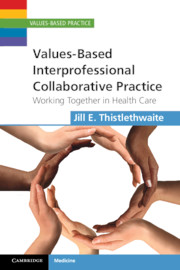Book contents
- Frontmatter
- Contents
- Preface
- Forewords
- Part 1 Introduction and theory
- Part 2 Primary care and the primary health care team
- 4 A patient complaint: team meetings, policy and practice values – raising awareness in the team
- 5 A well person health check, health promotion and disease prevention: different lifestyles, different values
- 6 A patient with medically unexplained symptoms: applying evidence and values for shared decision-making, self-care and co-production of health
- 7 A request for strong analgesia: honesty and trust
- 8 Asylum seekers and refugees: working across cultures
- 9 A request for a home birth and other pregnancy-related consultations
- 10 Community-based care and the wider health care team
- 11 Ageing and end of life decisions
- 12 Referrals and the interface between primary and secondary care: looking after ‘our’ patients
- 13 Living with visible difference and valuing appearance
- 14 Collaboration with other professionals: in and outside health care
- 15 Learning in and about teams
- Afterword
- Index
- References
8 - Asylum seekers and refugees: working across cultures
Published online by Cambridge University Press: 05 October 2012
- Frontmatter
- Contents
- Preface
- Forewords
- Part 1 Introduction and theory
- Part 2 Primary care and the primary health care team
- 4 A patient complaint: team meetings, policy and practice values – raising awareness in the team
- 5 A well person health check, health promotion and disease prevention: different lifestyles, different values
- 6 A patient with medically unexplained symptoms: applying evidence and values for shared decision-making, self-care and co-production of health
- 7 A request for strong analgesia: honesty and trust
- 8 Asylum seekers and refugees: working across cultures
- 9 A request for a home birth and other pregnancy-related consultations
- 10 Community-based care and the wider health care team
- 11 Ageing and end of life decisions
- 12 Referrals and the interface between primary and secondary care: looking after ‘our’ patients
- 13 Living with visible difference and valuing appearance
- 14 Collaboration with other professionals: in and outside health care
- 15 Learning in and about teams
- Afterword
- Index
- References
Summary
In this chapter we look at values relating to culture: working with people from other cultures (professionals and patients) and problems with bias and racism. These are difficult conversations and require us to reflect on our practice, how we relate to others from different backgrounds and with different languages from our own. The difference may be related to upbringing, social class and education as well as ethnicity, country of origin and customs.
Soraya and her son
Stonybrook Health Centre is a large multiprofessional health care provider in the inner city area of a deprived city. A high proportion of its patients do not speak English as a first, or even second language. The local population is multiethnic, multicultural and comes from more than 40 countries.
Reflection point
What difficulties do you envisage (or have) working and/or living in a place like Stonybrook? What might be the advantages as well as disadvantages? What, if any changes, might health professionals need to make in order to provide the optimal service for their clientele?
Onemorning Soraya Nimbini, accompanied by her 7 year old son Sukesh, attends the surgery. She was seen by one of the GPs as a new patient last week and in accordance with practice policy she was given an appointment with nurse practitioner Gina Caruso for a new patient check today. Gina is mentoring a fourth year medical student Philip Rohde during the morning. Soraya arrives 15 minutes late. She holds a tattered document in Arabic and simple English outlining her story of abuse at the hands of various militia in East Africa. Philip says hello but she ignores him and asks Gina to read it. The GP’s notes state that she is an asylum seeker, currently living with her husband and his older sister; the latter has a work visa for the UK. he GP also wrote that Soraya is trying to get pregnant but has not been able to do so for the last 6months. Soraya’s English is difficult to understand and she appears to be very shy. In particular, she does not look at Philip when he asks her questions. She is wearing a head scarf and abaya (full length garment covering the whole body including the arms) but does not have her face covered. The appointment is for herself but she also wants Sukesh to be checked over.
- Type
- Chapter
- Information
- Values-Based Interprofessional Collaborative PracticeWorking Together in Health Care, pp. 84 - 94Publisher: Cambridge University PressPrint publication year: 2012

